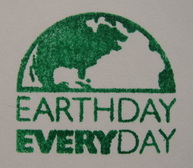
Earth Day is officially on April 22, but public celebrations take place on the closest Saturday and Sunday. This year there was very little fanfare about Earth Day.
History of Earth Day
Gaylord Nelson, a Wisconsin senator, after seeing the Santa Barbara oil spill in 1969, had the idea for a national Teach-In on the environment. Seeing the very effective college campus activism against Vietnam, he wanted to involve college activists as much as possible, and thought that week was the best one for them. On April 22, 1970, the first Earth Day took place in the United States, and the country came out in force. Out of this movement was born the U.S. Environmental Protection Agency (E.P.A.) that same year, a much respected organisation in North America. Later came the Clean Air act (’70), Clean Water act (’72), and Endangered Species act (’73). In 1990, Earth Day went global and 141 countries participated. The elder Bush declared it a national holiday, but it is not a Federal Holiday, it is in the same category as Halloween or Mother’s Day. By 2001, 184 countries participated.
Political Relevancy
Of course, the danger with having one Earth Day per year is that some people will attribute as much importance to it as they do to Halloween, and after the kids do the face painting in the park the whole family drives back home to barbecue burgers from beef raised in the former Amazon, eat them on styrofoam plates, even though they are home, and drink their bottled water! People groan when they hear 'every day is earth day'.
Overlapping dangers are that it becomes set in stone, loses relevancy, is no longer publicly controlled, and becomes an entity in itself, like a corporation. Witness how Earth Day is trademarked in Canada, as is the logo. Trademarking Earth Day is like trademarking the Happy Birthday song, or the knowledge of First Nations anywhere in the world -- and they’ve all taken place. It is very interesting to see the evolution of Earth Day in the U.S. -- there were originally 2 main organizing groups with different values, tactics, and sponsors.
Perhaps one important point to remember on Earth Day is that 130 species become extinct per DAY, that’s 1,000 times faster than natural extinction rates -- 70% of plants on earth are threatened with extinction.
The theme recently is on encouraging us to plant trees. This is starting to follow the same pattern as with pollution and recycling, where the onus was put on the individual and the household: mandating, legislating, and policing individual and household recycling, while leaving huge gaps and loopholes where the bulk of the problem really sits - with construction, industry, and corporations. We wouldn't all need to go out and plant trees, if governments did the job we pay them for of protecting the environment, and corporations didn't clear cut, strip mine, and frack.
Check out:
https://earthday.ca/ and http://www.earthday.org/earth-day/
ECO-audit.ca Your green blueprint
History of Earth Day
Gaylord Nelson, a Wisconsin senator, after seeing the Santa Barbara oil spill in 1969, had the idea for a national Teach-In on the environment. Seeing the very effective college campus activism against Vietnam, he wanted to involve college activists as much as possible, and thought that week was the best one for them. On April 22, 1970, the first Earth Day took place in the United States, and the country came out in force. Out of this movement was born the U.S. Environmental Protection Agency (E.P.A.) that same year, a much respected organisation in North America. Later came the Clean Air act (’70), Clean Water act (’72), and Endangered Species act (’73). In 1990, Earth Day went global and 141 countries participated. The elder Bush declared it a national holiday, but it is not a Federal Holiday, it is in the same category as Halloween or Mother’s Day. By 2001, 184 countries participated.
Political Relevancy
Of course, the danger with having one Earth Day per year is that some people will attribute as much importance to it as they do to Halloween, and after the kids do the face painting in the park the whole family drives back home to barbecue burgers from beef raised in the former Amazon, eat them on styrofoam plates, even though they are home, and drink their bottled water! People groan when they hear 'every day is earth day'.
Overlapping dangers are that it becomes set in stone, loses relevancy, is no longer publicly controlled, and becomes an entity in itself, like a corporation. Witness how Earth Day is trademarked in Canada, as is the logo. Trademarking Earth Day is like trademarking the Happy Birthday song, or the knowledge of First Nations anywhere in the world -- and they’ve all taken place. It is very interesting to see the evolution of Earth Day in the U.S. -- there were originally 2 main organizing groups with different values, tactics, and sponsors.
Perhaps one important point to remember on Earth Day is that 130 species become extinct per DAY, that’s 1,000 times faster than natural extinction rates -- 70% of plants on earth are threatened with extinction.
The theme recently is on encouraging us to plant trees. This is starting to follow the same pattern as with pollution and recycling, where the onus was put on the individual and the household: mandating, legislating, and policing individual and household recycling, while leaving huge gaps and loopholes where the bulk of the problem really sits - with construction, industry, and corporations. We wouldn't all need to go out and plant trees, if governments did the job we pay them for of protecting the environment, and corporations didn't clear cut, strip mine, and frack.
Check out:
https://earthday.ca/ and http://www.earthday.org/earth-day/
ECO-audit.ca Your green blueprint
 RSS Feed
RSS Feed